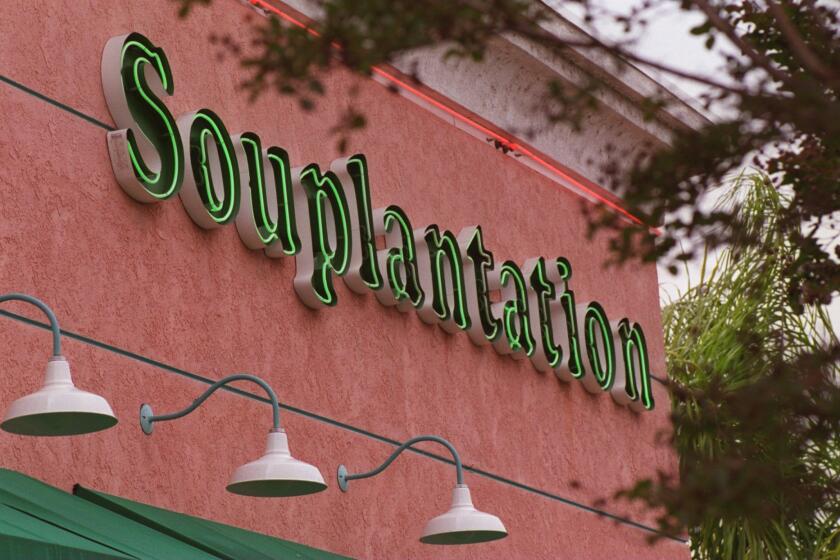Souplantation’s buffet-style restaurants closing for good because of the coronavirus
- Share via
SAN DIEGO — Souplantation, the popular buffet-style dining brand founded in San Diego 42 years ago, is closing all of its restaurants permanently, a casualty of the COVID-19 pandemic that is likely to be the death knell for all self-serve eateries.
The permanent closing of the 97 restaurants, including 44 in California, was announced Thursday after weeks of efforts to salvage San Diego-based Garden Fresh Restaurants, the parent company of Souplantation and Sweet Tomatoes. The closing will mean lost jobs for 4,400 employees.
“The FDA had previously put out recommendations that included discontinuing self-serve stations, like self-serve beverages in fast food, but they specifically talked about salad bars and buffets,” said John Haywood, chief executive of Garden Fresh. “The regulations are understandable, but unfortunately, it makes it very difficult to reopen. And I’m not sure the health departments are ever going to allow it.
“We could’ve overcome any other obstacle, and we’ve worked for eight weeks to overcome these intermittent financial challenges, but it doesn’t work if we are not allowed to continue our model.”
The closure comes as restaurants in California and across the country struggle to remain financially solvent amid a pandemic shutdown that has forced eateries to close dining rooms while allowing only curbside pickup and delivery. That sort of temporary pivot didn’t work for Souplantation, known for its affordable all-you-can-eat signature salad bar, house-made soups, focaccia pizza, baked goods, baked potato bar, pastas, soft serve ice cream and beverage bar.
Los Angeles magazine called it ‘aggressively mediocre,’ but its simple food and family-style seating reminded me of my Queens childhood.
The Garden Fresh restaurants’ swift drop in revenue, as fears about the coronavirus grew in February and March, was even more precipitous than at other eateries, given the buffet concept, said Robert Allbritton, chairman of Perpetual Capital Partners, a Washington, D.C., private investment firm that purchased the restaurant company following a bankruptcy filing in 2016.
“We spent two years researching and trying to improve things and actually got the business turned around,” Allbritton said. “We were growing the number of guests and were in the process of renovating the restaurants with new fixtures, carpeting, signage as late as January. We felt great about it. But I’ve got to tell you, when the virus hit, we went from 100% to 70 to 30 to 10% that fast, before the restaurants closed down and the company ran out of money in one week.”
Allbritton said that he wrote a check five weeks ago for $2.5 million to help cover the final payroll.
“We looked at the [federal] Paycheck Protection Program, but even with that we didn’t see how we could reopen the restaurants. We can’t take that money, it’s just disingenuous.”
Started in 1978, Garden Fresh originated as a single San Diego Souplantation location and, in 1986, expanded to the broader Southern California region, which continues to remain the core of the business. In 1990, the company moved beyond its local roots with a Palm Harbor, Fla., location under a separate brand name, Sweet Tomatoes, which itself grew to several locations.
In its more than four decades in business, Souplantation developed a loyal, almost fanatical following. Loved by many looking for a cheap meal, it became a frequent dining destination for college kids, immigrants and those on fixed incomes.
“Today is a sad day for buffet-obsessed immigrant families,” wrote Jenny Yang on Twitter. “You always fed me when I had little money and needed a place to sit and listen to angsty music,” wrote another user.
Haywood cited Georgia — one of the first states to reopen its businesses — in assessing Souplantation’s grim chances of survival. “Among the 39 regulations to reopen was that salad bars and buffets be discontinued.”
“All restaurants face an enormous challenge right now. Our challenge is somewhat doubled by the fact that we’re a salad bar and buffet,” he said.
“My personal opinion is that until there is a vaccine, many things like buffets and salad bars will have a very difficult time running and being viable.”
Weisberg writes for the San Diego Union-Tribune.
More to Read
Inside the business of entertainment
The Wide Shot brings you news, analysis and insights on everything from streaming wars to production — and what it all means for the future.
You may occasionally receive promotional content from the Los Angeles Times.













